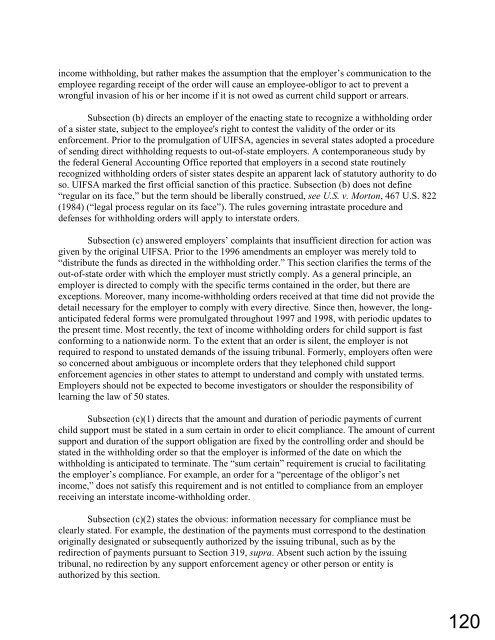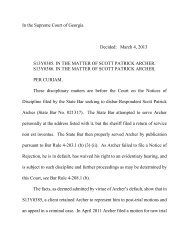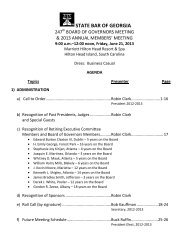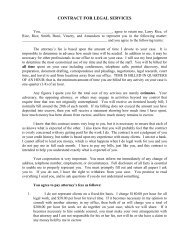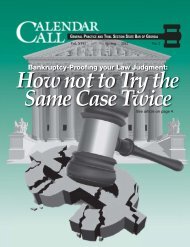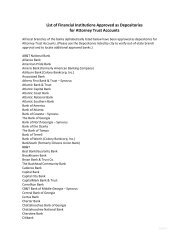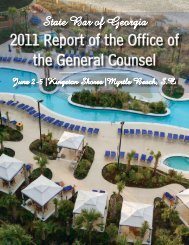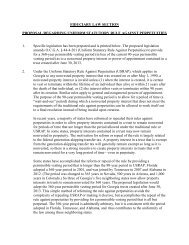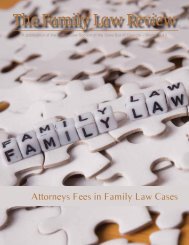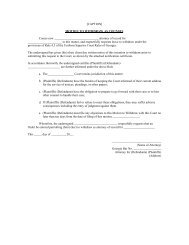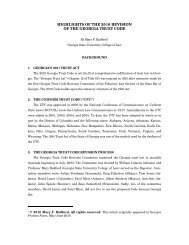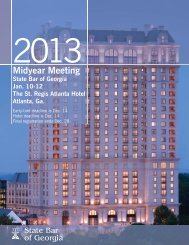2008 Amendments to the Uniform Interstate Family Support Act ...
2008 Amendments to the Uniform Interstate Family Support Act ...
2008 Amendments to the Uniform Interstate Family Support Act ...
You also want an ePaper? Increase the reach of your titles
YUMPU automatically turns print PDFs into web optimized ePapers that Google loves.
income withholding, but ra<strong>the</strong>r makes <strong>the</strong> assumption that <strong>the</strong> employer’s communication <strong>to</strong> <strong>the</strong><br />
employee regarding receipt of <strong>the</strong> order will cause an employee-obligor <strong>to</strong> act <strong>to</strong> prevent a<br />
wrongful invasion of his or her income if it is not owed as current child support or arrears.<br />
Subsection (b) directs an employer of <strong>the</strong> enacting state <strong>to</strong> recognize a withholding order<br />
of a sister state, subject <strong>to</strong> <strong>the</strong> employee's right <strong>to</strong> contest <strong>the</strong> validity of <strong>the</strong> order or its<br />
enforcement. Prior <strong>to</strong> <strong>the</strong> promulgation of UIFSA, agencies in several states adopted a procedure<br />
of sending direct withholding requests <strong>to</strong> out-of-state employers. A contemporaneous study by<br />
<strong>the</strong> federal General Accounting Office reported that employers in a second state routinely<br />
recognized withholding orders of sister states despite an apparent lack of statu<strong>to</strong>ry authority <strong>to</strong> do<br />
so. UIFSA marked <strong>the</strong> first official sanction of this practice. Subsection (b) does not define<br />
“regular on its face,” but <strong>the</strong> term should be liberally construed, see U.S. v. Mor<strong>to</strong>n, 467 U.S. 822<br />
(1984) (“legal process regular on its face”). The rules governing intrastate procedure and<br />
defenses for withholding orders will apply <strong>to</strong> interstate orders.<br />
Subsection (c) answered employers’ complaints that insufficient direction for action was<br />
given by <strong>the</strong> original UIFSA. Prior <strong>to</strong> <strong>the</strong> 1996 amendments an employer was merely <strong>to</strong>ld <strong>to</strong><br />
“distribute <strong>the</strong> funds as directed in <strong>the</strong> withholding order.” This section clarifies <strong>the</strong> terms of <strong>the</strong><br />
out-of-state order with which <strong>the</strong> employer must strictly comply. As a general principle, an<br />
employer is directed <strong>to</strong> comply with <strong>the</strong> specific terms contained in <strong>the</strong> order, but <strong>the</strong>re are<br />
exceptions. Moreover, many income-withholding orders received at that time did not provide <strong>the</strong><br />
detail necessary for <strong>the</strong> employer <strong>to</strong> comply with every directive. Since <strong>the</strong>n, however, <strong>the</strong> longanticipated<br />
federal forms were promulgated throughout 1997 and 1998, with periodic updates <strong>to</strong><br />
<strong>the</strong> present time. Most recently, <strong>the</strong> text of income withholding orders for child support is fast<br />
conforming <strong>to</strong> a nationwide norm. To <strong>the</strong> extent that an order is silent, <strong>the</strong> employer is not<br />
required <strong>to</strong> respond <strong>to</strong> unstated demands of <strong>the</strong> issuing tribunal. Formerly, employers often were<br />
so concerned about ambiguous or incomplete orders that <strong>the</strong>y telephoned child support<br />
enforcement agencies in o<strong>the</strong>r states <strong>to</strong> attempt <strong>to</strong> understand and comply with unstated terms.<br />
Employers should not be expected <strong>to</strong> become investiga<strong>to</strong>rs or shoulder <strong>the</strong> responsibility of<br />
learning <strong>the</strong> law of 50 states.<br />
Subsection (c)(1) directs that <strong>the</strong> amount and duration of periodic payments of current<br />
child support must be stated in a sum certain in order <strong>to</strong> elicit compliance. The amount of current<br />
support and duration of <strong>the</strong> support obligation are fixed by <strong>the</strong> controlling order and should be<br />
stated in <strong>the</strong> withholding order so that <strong>the</strong> employer is informed of <strong>the</strong> date on which <strong>the</strong><br />
withholding is anticipated <strong>to</strong> terminate. The “sum certain” requirement is crucial <strong>to</strong> facilitating<br />
<strong>the</strong> employer’s compliance. For example, an order for a “percentage of <strong>the</strong> obligor’s net<br />
income,” does not satisfy this requirement and is not entitled <strong>to</strong> compliance from an employer<br />
receiving an interstate income-withholding order.<br />
Subsection (c)(2) states <strong>the</strong> obvious: information necessary for compliance must be<br />
clearly stated. For example, <strong>the</strong> destination of <strong>the</strong> payments must correspond <strong>to</strong> <strong>the</strong> destination<br />
originally designated or subsequently authorized by <strong>the</strong> issuing tribunal, such as by <strong>the</strong><br />
redirection of payments pursuant <strong>to</strong> Section 319, supra. Absent such action by <strong>the</strong> issuing<br />
tribunal, no redirection by any support enforcement agency or o<strong>the</strong>r person or entity is<br />
authorized by this section.<br />
120


